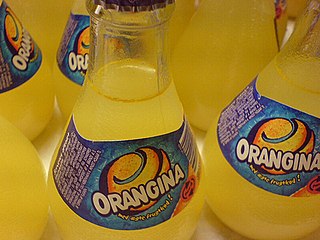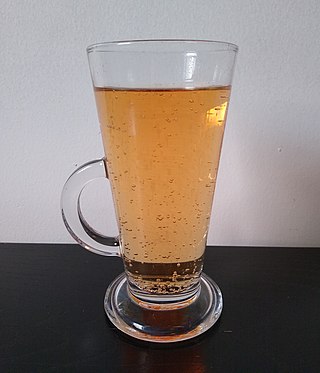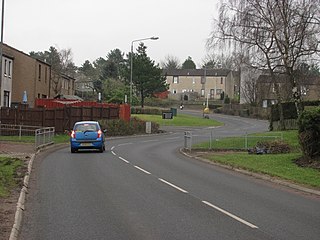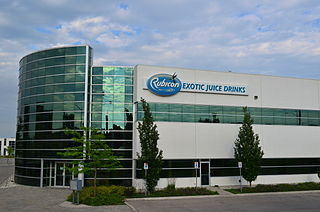
Cola is a carbonated soft drink flavored with vanilla, cinnamon, citrus oils, and other flavorings. Cola became popular worldwide after the American pharmacist John Stith Pemberton invented Coca-Cola, a trademarked brand, in 1886, which was imitated by other manufacturers. Most colas originally contained caffeine from the kola nut, leading to the drink's name, though other sources of caffeine are generally used in modern formulations. The Pemberton cola drink also contained a coca plant extract. His non-alcoholic recipe was inspired by the coca wine of pharmacist Angelo Mariani, created in 1863.

Irn-Bru is a Scottish carbonated soft drink, often described as "Scotland's other national drink". Introduced in 1901, the drink is produced in Westfield, Cumbernauld, North Lanarkshire, by A.G. Barr of Glasgow. As well as being sold throughout the United Kingdom, Irn-Bru is available throughout the world and can usually be bought where there is a significant community of people from Scotland. The brand also has its own tartan. It has been the top-selling soft drink in Scotland for over a century, competing directly with global brands such as Coca-Cola.

Orangina is a lightly carbonated beverage made from carbonated water, 12% citrus juice, as well as 2% orange pulp. Orangina is sweetened with sugar or high fructose corn syrup and in some markets with artificial sweetener. Natural flavors are also added.

Inca Kola is a soft drink that was created in Peru in 1935 by British immigrant Joseph Robinson Lindley. The soda has a sweet, fruity flavor that somewhat resembles its main ingredient, lemon verbena. Americans compare its flavor to bubblegum or cream soda, and it is sometimes categorized as a champagne cola.

Cream soda is a sweet soft drink. Generally flavored with vanilla and based on the taste of an ice cream float, a wide range of variations can be found worldwide.

Tizer is a red-coloured, citrus-flavoured soft drink bottled in Cumbernauld, North Lanarkshire, and sold in the United Kingdom. The name originally comes from the phrase "Tizer the Appetizer". It was launched in 1924 by Fred and Tom Pickup of Pudsey when it was known as "Pickup's Appetizer".

Britvic plc is a British producer of soft drinks based in Hemel Hempstead, England. It is listed on the London Stock Exchange and is a constituent of the FTSE 250 Index. It produces soft drinks under its own name, and several other brands.

The Coca-Cola Company is an American multinational corporation founded in 1892. It produces Coca-Cola. The drink industry company also manufactures, sells, and markets other non-alcoholic beverage concentrates and syrups, and alcoholic beverages. The company's stock is listed on the NYSE and is part of the DJIA and the S&P 500 and S&P 100 indexes.
Barr Cola is a cola made from kola nuts by the A.G. Barr company, makers of Irn-Bru. The drink was first released in 1875. It was once called Strike Cola and was popular in Britain's fish and chip shops and convenience stores. The drink is often enjoyed by the youth of Britain. Now it is still enjoyed by many, but largely overshadowed by the companies bigger drink Irn-Bru. Barr Cola can be purchased in 250ml bottles, 330ml cans, 500ml bottles, 750ml glass bottles and 2 litre plastic bottles. Barr’s Cola is suitable for vegans. The drink is produced in the A.G. Barr factories in Forfar, Milton Keynes and Cumbernauld. Each factory can produce up to 120,000 cans of Barr Cola every minute. Barr Cola and its different flavours are sold in the supermarkets Sainsburys, Asda, Morrisons and Iceland. They can also be bought in many smaller establishments throughout the UK.
A secret ingredient is a component of a product that is closely guarded from public disclosure for competitive advantage. Sometimes the ingredient makes a noticeable difference in the way a product performs, looks or tastes; other times it is used for advertising puffery. Companies can go to elaborate lengths to maintain secrecy, repackaging ingredients in one location, partially mixing them in another and relabeling them for shipment to a third, and so on. Secret ingredients are normally not patented because that would result in publication, but they are protected by trade secret laws. Employees who need access to the secret are usually required to sign non-disclosure agreements.
Appletiser is a sparkling fruit juice created by blending fruit juice with carbonated water. It was created in 1966 in Elgin Valley, Western Cape, South Africa, by French-Italian immigrant Edmond Lombardi. Whilst Appletiser is primarily sold in its home market of South Africa, the brand is also exported to more than 20 other countries, including the Southern African Development Community (SADC), as well as the UK, Belgium, Spain, Japan, Hong Kong, Australia and New Zealand.

Westfield is an area of the town of Cumbernauld in Scotland. Westfield is a popular residential area originally built by Cumbernauld Development Corporation in the late 1970s and early 1980s. It comprises a residential area and a large industrial estate. Historically there was a farm at Westfield as shown on Roy's map of the Lowlands and the 1st 25 inch Ordnance Survey Map of Scotland. It is located near Condorrat and Broadwood Stadium, home of Clyde FC. Historically, there were two local primary schools, St Francis of Assisi Primary School and Westfield Primary School. St. Francis of Assisi Primary School closed in 2009. The site has been re-developed by North Lanarkshire Council with new, high quality social housing available to rent. The new street is named Netherinch Way. Westfield also has other modern, private developments for example a new Bellway Housing development sits near Broadwood stadium along with a neighboring housing development. Westfield has a selection of frequent bus services to Airdrie, Cumbernauld Town Centre, Glasgow, Kilsyth and Kirkintilloch with buses operated by David Allan Coaches, First Group & McGills. In 2017 plans for a new retail park near Broadwood Studium were approved.

Rubicon Exotic Juices is a beverage manufacturer with headquarters in Richmond Hill, Ontario, Canada and Milton Keynes, United Kingdom. It was founded in the United Kingdom in 1981. The company specializes in producing juice drinks from exotic fruits, and produces energy drinks. The company is owned by A.G. Barr.
Barr Britvic Soft Drinks plc was a proposed company to be founded by the merger between two British soft drink manufacturers, A.G. Barr and Britvic. Former Britvic shareholders were to own 63 per cent of the combined entity, whilst Barr shareholders would have held 37 per cent. Measured by revenue, it would have been one of the largest soft drinks companies in Europe. The company would have had annual sales of more than £1.5 billion and would have employed around 4,300 staff.
Events from the year 1901 in Scotland.

The 2016–17 Scottish Challenge Cup, known as the IRN-BRU Cup due to sponsorship reasons, was the 26th season of the competition. The tournament took on a different format from previous seasons with a total of 54 teams participating. It was the first season with two clubs from both Northern Ireland and Wales competing alongside the 30 members of the 2016–17 Scottish Championship, 2016–17 Scottish League One and 2016–17 Scottish League Two, four teams from the 2016–17 Highland Football League and four from the 2016–17 Lowland Football League as well as the Under-20 teams of the teams competing in the 2016–17 Scottish Premiership.













